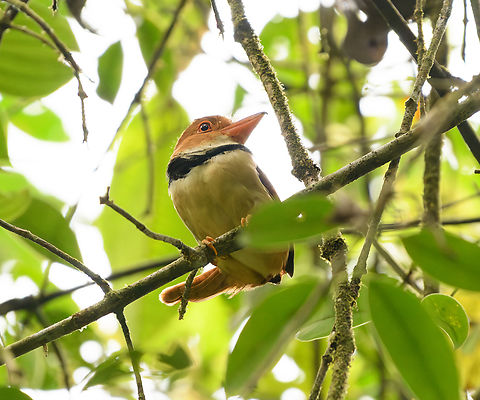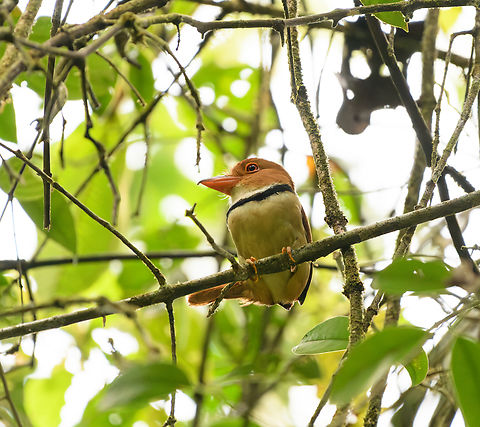
Appearance
The collared puffbird is about 19 cm long and weighs 46 to 62 g. Its head and back are dark rufous, the rump a lighter rufous, and the tail orange-chestnut with narrow black bars. The folded wing shows fine black barring on a brown background. The chin and throat are white to buffy white that extend around the nape as a thin buffy line. Below them are a wide black collar that encircles the chest and upper back. The lower breast and the center of the belly are buffy white that darkens to dull orange on the flanks and vent. The eye is surrounded by bare orange-yellow skin; the eye color can be whitish, orange, or vermilion. The bill is mostly orange with some dusky on the maxilla. The feet can be light green, orange, or brown.
Distribution
The collared puffbird is found in most of the Amazon Basin, from southeastern Colombia south through eastern Ecuador and Peru to northern Bolivia and east through southern Venezuela, the Guianas, and northern Brazil. In Brazil it is found as far east as Belém and south into Mato Grosso.Status
The IUCN has assessed the collared puffbird as being of Least Concern. It has an extremely large range; however, its population has not been quantified and is believed to be decreasing. It is considered common in much of Brazil and rare to uncommon in the western part of its range. It occurs in several protected areas but seems to be highly sensitive to habitat disturbance outside of them.Habitat
It inhabits humid primary "terra firme" forest, drier hilly country, and also "várzea" forest in the lower Amazon. In elevation it ranges from sea level to 1,700 m but is usually found below 1,000 m.Reproduction
The collared puffbird's breeding season spans at least May to September. It lays its two glossy white eggs in a cavity excavated in an arboreal termitarium or rotted tree trunk.Food
The collared puffbird hunts by sallying from a shaded perch to pluck prey from foliage, bark, or the forest floor. Its prey includes lizards, snakes, frogs, and several types of large insects. It sometimes joins mixed-species foraging flocks and less often follows army ant swarms.References:
Some text fragments are auto parsed from Wikipedia.